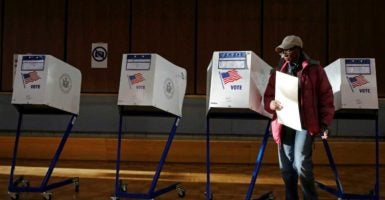The Supreme Court declined to review a ruling that struck down North Carolina’s voter ID law Monday, dealing a blow to ballot integrity measures around the country.
The law, adopted days after the Supreme Court effectively struck down Section 5 of the Voting Rights Act in Shelby County v. Holder, requires voters to present a government-issued photo identification before casting ballots.

The law also eliminated same-day voter registration, and significantly reduced the number of early voting days. In a brutal finding last year, the 4th U.S. Circuit Court of Appeals struck down the law, in a blockbuster ruling that declared the state Legislature had acted with discriminatory intent when adopting the law, in violation of Section 2 of the Voting Rights Act and the Constitution’s Equal Protection Clause.
The court said the law “targeted African-Americans with almost surgical precision.”
North Carolina Republicans hoped the Supreme Court would salvage the law, but that effort was stymied by the 2016 general election, in which the state’s incumbent GOP governor was unseated by Democrat Roy Cooper. The new governor and the state’s Democratic attorney general worked to withdraw the state from the litigation.
Chief Justice John Roberts, who many believed would be sympathetic to the state, issued a statement regarding the court’s denial to rehear the case. Roberts explained that political developments in the [state] created confusion as to who is entitled to bring an appeal.
The American Civil Liberties Union, which led a coalition of civil rights groups challenging the law, said the court’s decision will close an “ugly chapter in voter suppression.”
“This law, enacted with what the appeals court called discriminatory intent and ‘almost surgical precision’ targeting African-American voters, is meeting its much-deserved demise,” said Dale Ho, director of the ACLU’s Voting Rights Project. “An ugly chapter in voter suppression is finally closing.”
Content created by The Daily Caller News Foundation is available without charge to any eligible news publisher that can provide a large audience. For licensing opportunities for this original content, please email [email protected].
































